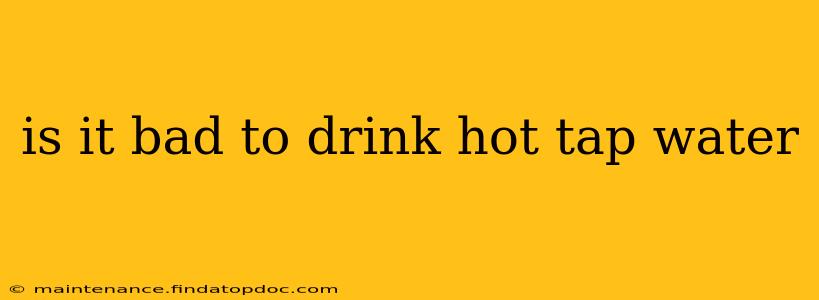Many of us reach for the hot tap when we need hot water for tea or instant coffee. But is this common practice actually harmful? The short answer is: it depends. While generally not dangerous in many areas, there are factors to consider before regularly consuming hot tap water. This guide will explore the potential risks and benefits, helping you make an informed decision.
What are the potential risks of drinking hot tap water?
This is a key concern for many people. The risks associated with drinking hot tap water stem primarily from the potential presence of contaminants that may become more concentrated or released at higher temperatures.
-
Increased concentration of contaminants: Some contaminants, like lead, can leach into the water at higher temperatures. Older plumbing systems, especially those with lead pipes, pose a significant risk. The hotter the water, the greater the potential for lead leaching.
-
Volatile organic compounds (VOCs): Heating water can vaporize certain VOCs, potentially increasing their concentration in the hot water. While some VOCs are naturally occurring, others are man-made pollutants that can be harmful to health.
-
Bacteria: Although hot water can kill some bacteria, it's not a guarantee. If there's a bacterial contamination in your water supply, hot water might not eliminate all pathogens. Furthermore, heating water doesn't sterilize the pipes themselves.
-
Chlorine byproducts: While chlorine is used to disinfect water, heating it can create trihalomethanes (THMs), which are potentially carcinogenic byproducts.
Does heating tap water kill bacteria?
Partially, but not completely. While boiling water is an effective method of killing most harmful bacteria and viruses, simply heating tap water to a warm or hot temperature isn't a reliable sterilization process. Bacteria can survive temperatures that are below boiling point. Therefore, relying on hot tap water to eliminate all bacteria is risky.
Is hot tap water safe to drink?
It's not universally safe. The safety of drinking hot tap water heavily depends on several factors:
- The age and material of your plumbing: Older pipes, particularly those containing lead, are a significant concern.
- The quality of your municipal water supply: Regular testing and maintenance by your local water authority are vital. Check their reports for information on contaminants.
- The temperature of the water: Excessively hot water can exacerbate the leaching of certain contaminants.
- The purpose of use: While using hot tap water for tea might pose less risk than drinking it straight, it's still best to err on the side of caution.
What are the alternatives to drinking hot tap water?
Always prioritize safe drinking water. Here are some alternatives:
- Boiled water: This is the safest option, as boiling effectively kills most harmful bacteria and viruses.
- Filtered water: A good quality water filter can remove many contaminants, making tap water safer to drink, whether hot or cold.
- Bottled water: While convenient, bottled water contributes to plastic waste and can be more expensive in the long run.
How can I improve the safety of my hot tap water?
- Let the water run: Run your hot water tap for a few seconds before using it to flush out stagnant water that may have accumulated in the pipes.
- Regularly check your water quality reports: Your local water authority should provide regular reports on the quality of your tap water.
- Consider a water filter: A whole-house filter or a point-of-use filter can significantly improve water quality.
- Upgrade your plumbing: If you suspect your pipes are old or made of lead, consider replacing them.
In conclusion, while drinking hot tap water might seem convenient, it's crucial to be aware of the potential risks. The safety of your hot tap water depends heavily on your specific situation. Prioritizing safe water practices, such as boiling or filtering, is highly recommended to protect your health. If you have concerns about your water quality, contact your local water authority or a qualified plumber for advice.
